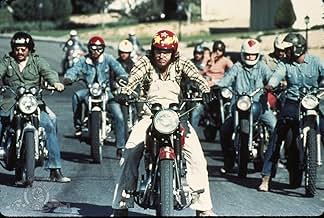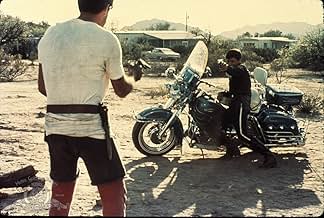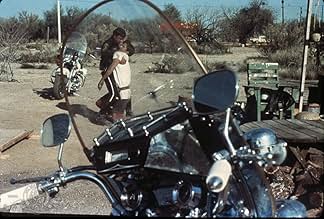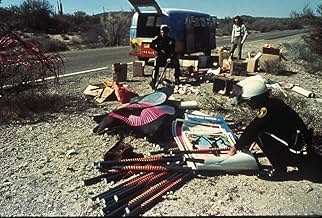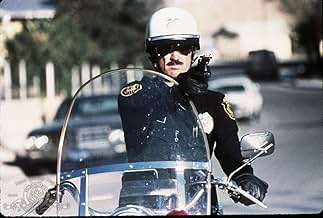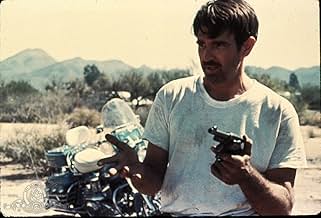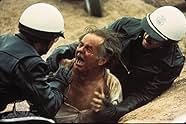Electra Glide in Blue
- 1973
- Tous publics
- 1h 54min
NOTE IMDb
7,0/10
6,9 k
MA NOTE
John Wintergreen, un motard ambitieux mais de petite taille, patrouille sur les routes de l'Arizona, aspirant à une promotion au poste d'inspecteur de la criminelle, tout en enquêtant sur un... Tout lireJohn Wintergreen, un motard ambitieux mais de petite taille, patrouille sur les routes de l'Arizona, aspirant à une promotion au poste d'inspecteur de la criminelle, tout en enquêtant sur un meurtre lié aux hippies.John Wintergreen, un motard ambitieux mais de petite taille, patrouille sur les routes de l'Arizona, aspirant à une promotion au poste d'inspecteur de la criminelle, tout en enquêtant sur un meurtre lié aux hippies.
- Réalisation
- Scénario
- Casting principal
- Récompenses
- 3 nominations au total
Billy Green Bush
- Zipper
- (as Billy 'Green' Bush)
Elisha Cook Jr.
- Willie
- (as Elisha Cook)
Hawk Wolinski
- VW Bus Driver
- (as David J. Wolinski)
Melissa Greene
- Zemko's Girlfriend
- (as Melissa Green)
Avis à la une
Much chat about this film, especially now since it's 'finally' out on DVD in wide screen format.
This is the best film of a specialized genre from the late 60's through early 1970's exploring the counter-culture revolution and the "Establishment".
Unlike Easy Rider, A Clockwork Orange and Billy Jack, EGIB hits the nail on the head. There is evil everywhere, and good intentions don't always result in good outcomes.
Beautiful directorial debut by Guercio, awesome cinematography by Conrad Hall.
In essence, one of the best films from 1973.
This is the best film of a specialized genre from the late 60's through early 1970's exploring the counter-culture revolution and the "Establishment".
Unlike Easy Rider, A Clockwork Orange and Billy Jack, EGIB hits the nail on the head. There is evil everywhere, and good intentions don't always result in good outcomes.
Beautiful directorial debut by Guercio, awesome cinematography by Conrad Hall.
In essence, one of the best films from 1973.
An incredible piece of film making, this beautifully shot movie really is about as poetic as it's possible for cinema to be and still have a coherent, gripping narrative. It feels like a western with its dramatic monument valley backdrop and masculine themes, but plays more like a European movie, with it's dark characterisations and existential mood . The soundtrack is fantastic and the feeling the movie imparts is unique. I always recommend this film to people because so few have ever seen it. I think it's a tragedy that James Guercio didn't make more movies because this was his first (and only) film and it's up there with the best of Peckinpah/Leone/Boorman/Seigal (whose work is similar). I'll never forget this film and the ending will live with me forever. If you like movies you need to see this film, This is real Cinema.
Before he found himself on the wrong side of a murder investigation, Blake was noted for playing an unconventional cop on the TV show "Baretta" (and also the flip side as a brutal killer in the film "In Cold Blood".) Here he is a square peg trying to fit into a round hole as a California Highway Patrolman with dreams of more. At 5'4", he is a full head shorter than the shortest of his fellow motorcycle-riding fellow officers. Though his cohort Bush balances his days between sitting on his bike reading comic books and listening to the radio with pulling over anyone even remotely suspicious, Blake yearns to be a better cop than that and, ultimately, a detective. When (after a thoroughly gripping opening sequence) a man is found shot to death, Blake seizes the opportunity to piece the situation together and becomes the driver and right hand man to hotshot detective Ryan. As the pair attempts to solve the mystery of the man's death, their faults, attributes and insecurities are laid bare (notably in an extended scene with Riley, a barmaid who has known both men for a long time.) Finally, the truth of the death comes to light, but only after significant turmoil, carnage and some surprises. Blake is terrific in the lead. He perfectly captures the awkwardness mixed with ambition of his character. He has many memorable scenes, more than a few of which that poke fun at his size (though he was in great physical shape at the time.) Bush lends strong support as his rather amoral buddy. Ryan is splendidly authoritarian and paints a memorable portrait of a man who is a big shot (especially in his own mind) every time and everywhere except when it counts. He is perfect in the role. Cook has a very showy and effective role as a mentally challenged old man who discovers the body. Riley is effective in her sleazy, but sympathetic role, but her big scene does seem out of place somehow and shifts the focus of the movie more than it probably ought to. Dano, a strong character actor in countless TV and film projects, does an excellent job as a jaded coroner (a far cry from "Quincy M.D.", he not only eschews a surgical mask, but smokes a cigarette during the autopsy!) The film is gorgeously photographed and extremely creatively directed. It had to be way ahead of its time in terms of camera-work. The texture and atmosphere of the scenes is beyond most of what is cranked out today. It's also loaded with quirkiness and irony (some might say overloaded.) In any case, it's a unique viewing experience with many rewards for the patient and incisive viewer. There's also a motorcycle chase that rivals any of the best from this period. Like so many films, the only way it can be fully appreciated is in the widescreen format. The glimpses of Monument Valley are welcome and add much to the visual appeal of the film. The film isn't completely flawless, but it is highly memorable. The title refers to the make and color of a motorcycle.
With those evocative images and that emotionally charged music, the final fifteen minutes are electrifying. It's all about America, and a terrible ten years of assassinations, Viet Nam, and countless other cultural strife. The film's ending is saying ... enough is enough. Let the healing begin. And as American culture bled in the late 1960s and early 1970s, so too did the emotional lives of individuals, like the hodgepodge of aggrieved characters that come and go in this story.
Seeing some of these people and listening to their individual stories of pain and suffering is John Wintergreen (Robert Blake), a by-the-book Arizona motorcycle cop, short on stature but tall on dreams. Sometimes with his partner Zipper (Billy Green Bush), "Big John" encounters these tormented souls, on the road mostly. That's his job. The film's story is an ode to the courage and nobility of ordinary Americans pained by reality with only their dreams to comfort them.
The film's disjointed plot begins with a killing. And this incident keeps the plot moving. But "Electra Glide In Blue" is mostly a character study, not a crime film. Color cinematography is quite good. Interior shots have lots of close-ups, even extreme close-ups. There's a lot of diffuse lighting. Exteriors are shot like a modern-day Western. Indeed, the look and feel of the film is similar in some ways to the old John Ford Westerns, like "The Searchers".
The plot is the main weakness of the film. Some parts are overplayed, like the chase scenes. There's a lack of continuity both in storyline and in visual elements. It's as if many scenes were shot impromptu, on the rush. And some of the acting is way over the top. However, Robert Blake does a fine job as America's everyday cop with his sense of principles.
This film reminds me in some ways of "Zabriskie Point" (1970), a counter culture film which has a powerful ending that helps to make up for earlier plot problems.
Based on a real-life event, "Electra Glide In Blue" gets off to a slow start. Even midway through, one wonders whether this film is going anywhere or has any point to it. It is, and it does. You just have to wait for that powerful ending and its cinematic message of a tormented America, from the point of view of one lonely cop, just doing his job.
Seeing some of these people and listening to their individual stories of pain and suffering is John Wintergreen (Robert Blake), a by-the-book Arizona motorcycle cop, short on stature but tall on dreams. Sometimes with his partner Zipper (Billy Green Bush), "Big John" encounters these tormented souls, on the road mostly. That's his job. The film's story is an ode to the courage and nobility of ordinary Americans pained by reality with only their dreams to comfort them.
The film's disjointed plot begins with a killing. And this incident keeps the plot moving. But "Electra Glide In Blue" is mostly a character study, not a crime film. Color cinematography is quite good. Interior shots have lots of close-ups, even extreme close-ups. There's a lot of diffuse lighting. Exteriors are shot like a modern-day Western. Indeed, the look and feel of the film is similar in some ways to the old John Ford Westerns, like "The Searchers".
The plot is the main weakness of the film. Some parts are overplayed, like the chase scenes. There's a lack of continuity both in storyline and in visual elements. It's as if many scenes were shot impromptu, on the rush. And some of the acting is way over the top. However, Robert Blake does a fine job as America's everyday cop with his sense of principles.
This film reminds me in some ways of "Zabriskie Point" (1970), a counter culture film which has a powerful ending that helps to make up for earlier plot problems.
Based on a real-life event, "Electra Glide In Blue" gets off to a slow start. Even midway through, one wonders whether this film is going anywhere or has any point to it. It is, and it does. You just have to wait for that powerful ending and its cinematic message of a tormented America, from the point of view of one lonely cop, just doing his job.
A requiem for the death of the American hero. No, this is not the plot--this is what the movie accomplishes. Do not mistake this existential parable for what may otherwise seem like a superficial counter culture exploitation flick--it is nothing of the sort.
Record producer Guercio's first (and last) effort at filmmaking (captured beautifully by the late cinematographer Conrad Hall) leaves the viewer wondering "where have all the cowboys gone?" John Ford taught us that the hero rode a white horse and did the right thing, even if it killed him-, and in this Vietnam era analogue, Blake is a five foot four inch leather clad motorcycle cop writing speeding tickets along a lonely two lane road cutting through monument valley. With high hopes and ideals, he aspires not only to do more but to become more...and for a while he succeeds. But the world is different, people are different, and the old heroes he admired are not just obsolete--they are extinct.
We are inexorably drawn through his disillusionment and our own to an ending that is sad, tragic, and inevitable.
Record producer Guercio's first (and last) effort at filmmaking (captured beautifully by the late cinematographer Conrad Hall) leaves the viewer wondering "where have all the cowboys gone?" John Ford taught us that the hero rode a white horse and did the right thing, even if it killed him-, and in this Vietnam era analogue, Blake is a five foot four inch leather clad motorcycle cop writing speeding tickets along a lonely two lane road cutting through monument valley. With high hopes and ideals, he aspires not only to do more but to become more...and for a while he succeeds. But the world is different, people are different, and the old heroes he admired are not just obsolete--they are extinct.
We are inexorably drawn through his disillusionment and our own to an ending that is sad, tragic, and inevitable.
Le saviez-vous
- AnecdotesFirst-time director James William Guercio wanted Conrad L. Hall to photograph this film, but Hall's salary was more than was budgeted for a cinematographer. Guercio reduced his own salary to $1.00 so he could secure Hall as the cinematographer.
- GaffesIn the final driving scenes, the van and the bike, supposedly driving along a long straight road, drive by the same distant butte at least three times.
- Citations
Harve Poole: Incompetence is the worst form of corruption.
- Versions alternativesJohn Wintergreen is called John Winterberg in the German version.
- ConnexionsEdited into The Our Gang Story (1994)
Meilleurs choix
Connectez-vous pour évaluer et suivre la liste de favoris afin de recevoir des recommandations personnalisées
- How long is Electra Glide in Blue?Alimenté par Alexa
Détails
Box-office
- Montant brut aux États-Unis et au Canada
- 1 600 000 $US
- Durée
- 1h 54min(114 min)
- Couleur
- Mixage
- Rapport de forme
- 2.39 : 1
Contribuer à cette page
Suggérer une modification ou ajouter du contenu manquant


